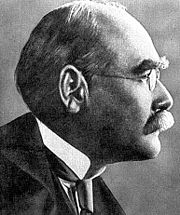Danny Deever
Starting with The Three Musketeers (March 1887, then Plain Tales), he began a series with a recurring trio of privates, Learoyd, Mulvaney and Ortheris, who described the adventures of barracks life in exaggerated Yorkshire, Irish, and Cockney accents.
Here, his first new poetry was published (under a pseudonym, "Yussuf") in Macmillan's Magazine in November and December 1889 - one of these, The Ballad of East and West, would become one of his best known works[8] - followed by a series of pieces submitted to William Henley's Scots Observer.
[10] Edmonia Hill, a friend who travelled with him on the voyage to America, wrote in her diary that after leaving Burma he announced "I'll write some Tommy Atkins ballads".
The young soldier is unaware of what is happening, at first – he asks why the bugles are blowing, and why the Sergeant looks so pale, but is told that Deever is being hanged, and that the regiment is drawn up in "[h]ollow square" to see it.
The fourth verse comes to the hanging; Files sees the body against the sun, and then feels his soul as it "whimpers" overhead; the term reflects a shudder in the ranks as they watch Deever die.
Finally, the Sergeant moves the men away; though it is not directly mentioned in the poem, they would be marched past the corpse on the gallows[13] – reflecting that the recruits are shaking after their ordeal, and that "they'll want their beer to-day".
The first four lines always end with the same word, and the last four feature an aaab rhyme scheme with slightly lighter syllables that force the pace into a brisk march despite its somber mood (cf.
As the scholar Henry W. Wells put it in 1943, Kipling's chorus with "tripping anapaests" contrasts with the "grave iambs" of the verses, is powerfully expressive of the "masterly irony" in the ballad.
[18] The poem was later commented on by the poet William Butler Yeats, who noted that "[Kipling] interests a critical audience today by the grotesque tragedy of Danny Deever".
[21] Both Yeats and Eliot were writing shortly after Kipling's death, in 1936 and 1941, when critical opinion of his poetry was at a low point; both, nonetheless, drew out Danny Deever for attention as a significant work.
Discussing that low critical opinion in a 1942 essay, George Orwell described Danny Deever as an example of Kipling "at his worst, and also his most vital ... almost a shameful pleasure, like the taste for cheap sweets that some people secretly carry into middle life".
He felt the work was an example of what he described as "good bad poetry"; verse which is essentially vulgar, yet undeniably seductive and "a sign of the emotional overlap between the intellectual and the ordinary man.
In this specific case, the musical source has been suggested as the Army's "grotesque bawdy song" Barnacle Bill the Sailor, but it is possible that some other popular tune of the period was used.
[25] The tune "They're Hanging Danny Deever in the Morning" (Walter Damrosch) was played from the Campanile at UC Berkeley at the end of the last day of classes for the Spring Semester of 1930, and has been repeated every year since, with a certain ironic humour, at the beginning of final exams week, making it one of the oldest campus traditions.
